Application value of Qisexingtai hand diagnostic method in diagnosis of coronary artery disease
LIU Qian,ZHAO Zhupei,GUO Hua,WANG Shiheng,HAO Mingzhao,QIN Peijie,WANG Liuqing,LIU Xuechun,ZHANG Fengxia,AN Hong,LI Yu,SHI Xueqin,ZHU Tingyu,LIU Jianfeng,WANG Liying,XU Tao,ZHANG Limei,ZOU Xu
LIU Qian,ZHAO Zhupei,WANG Shiheng,HAO Mingzhao,QIN Peijie,WANG Liuqing,LIU Xuechun,ZHANG Fengxia,AN Hong,LI Yu,SHI Xueqin,ZHU Tingyu,LIU Jianfeng,Institute for the History of Chinese Medicine and Medical Literature,China Academy of Chinese Medical Sciences,Beijing 100700,China
GUO Hua,Graduate School of China Academy of Chinese Medical Sciences,Beijing 100700,China
WANG Liying,Institute of Basic Research in Clinical Medicine,China Academy of Chinese Medical Sciences,Beijing 100700,China
XU Tao,China Chest Pain Center,The Second Affiliated Hospital of Guizhou University of Traditional Chinese Medicine,Guizhou 550003,China
ZHANG Limei,Guang'anmen Hospital,China Academy of Chinese Medical Sciences,Beijing 100053,China
ZOU Xu,Department of Cardiovascular Diseases,Guangdong Provincial Hospital of Traditional Chinese Medicine,Guangzhou 510120,China
Abstract OBJECTIVE: To evaluate the diagnostic efficacy of Qisexingtai hand diagnostic method in the diagnosis of coronary artery disease (CAD).METHODS: This was an investigator-initiated,prospective,multi-center,cross-sectional study.All the participants from three hospitals in China had been diagnosed by both Qisexingtai hand diagnostic method and coronary angiography.We compared the two diagnostic methods to calculate the sensitivity,the specificity,the omission diagnostic rate,the mistaken diagnostic rate and accuracy in order to evaluate the diagnostic efficacy of Qisexingtai hand diagnostic method for CAD.RESULTS: A total of 326 subjects were enrolled,diagnosed by both Qisexingtai hand diagnostic method and coronary angiography.As a result,there were 166 positive cases according to Qisexingtai hand diagnostic method,and 131 positive cases according to coronary angiography.Compared with the results of coronary angiography,the sensitivity of Qisexingtai hand diagnostic method was 80.2%,the specificity was 68.7%,the omission diagnostic rate was 19.8%,the mistaken diagnostic rate was 31.3%,and the accuracy was 73.3%.Area under the receiver operating characteristic curve was estimated as 0.735 for all,and 0.718,0.735,0.783 for the three sub-centers.CONCLUSION: Qisexingtai hand diagnostic method with high accuracy and sensitivity has certain application value in the diagnosis of CAD.
Keywords: hand diagnosis;coronary artery disease;diagnostic tests,routine;Qisexingtai
1.INTRODUCTION
Coronary artery disease (CAD) remains a leading cause of morbidity and mortality worldwide.1According to epidemiological investigation,mortality rate of CAD is 120.18/100 000 in urban residents and 128.24/100 000 in rural residents.2Up to date,coronary angiography is the gold standard for the diagnosis of CAD.1However,it is not well accepted by patients due to invasiveness,radioactivity and contrast agent metabolism problem.Finding more acceptable methods for the diagnosis of CAD has been necessary.Qisexingtai hand diagnostic method was theorized by Professor Liu Jianfeng in 1991,3that CAD could be diagnosed observing the changes ofQi,color and shape in the specific reaction area of hands.This study aimed to evaluate the diagnostic efficacy of Qisexingtai hand diagnostic method and provide reference for clinical diagnosis of CAD.
2.MATERIALS AND METHODS
2.1.Study design
This was an investigator-initiated,prospective,multicenter,cross-sectional diagnostic test with blind evaluation of outcomes.And registered on the Chinese Clinical Trial Registry with registration number ChiCTR2000039565.
This study was approved by the ethics committee of Guang'anmen Hospital,China Academy of Chinese Medical Sciences,the ethics committee of Guangdong Provincial Hospital of Traditional Chinese Medicine and the ethics committee of The Second Affiliated Hospital of Guizhou University of Traditional Chinese Medicine,and written informed consent was obtained from all participants before enrollment.
2.2.Participants
Participants were recruited from Guang'anmen Hospital,China Academy of Chinese Medical Sciences,Guangdong Provincial Hospital of Traditional Chinese Medicine and The Second Affiliated Hospital of Guizhou University of Traditional Chinese Medicine from November 2020 to September 2021.
2.3.Sample size calculation
According to the clinical data,the sensitivity of Qisexingtai hand diagnostic method was 94.4%,the specificity was 58.27%,α=0.05,power=90%,we calculated that:

Including 5% eliminated cases,the sample size should be 324 at least.
2.4.Inclusion criteria
Participants fulfilled all the following conditions were eligible for inclusion: (a) above 40 years old,gender unlimited;(b) voluntarily requested for coronary angiography or followed the recommendation of the physicians according to the clinical condition;(c)volunteered to participate in this study and cooperated with doctors in the research process;(d) mentally normal without cognitive impairment;and (e) signed the informed consent.
2.5.Exclusion criteria
Participants with any of the following conditions were excluded from the study: (a) contraindications to coronary angiography;(b) previous history of CAD or coronary artery revascularization;(c) color changed of hand caused by drinking,allergy or dyeing;(d) pale hands influenced on the observation due to acute and severe diseases such as acute myocardial infarction,acute cerebrovascular disease,severe pain,severe bleeding,infectious diseases,and renal insufficiency at the end-stage of diseases;(e) unrecognizable for rough skin caused by external force;(f) with diseases cause hand deformation,skin lesions,color abnormalities such as rheumatoid arthritis,eczema,vitiligo,median nerve injury;(g) with mental diseases;and (h) participating in other clinical studies.
2.6.Elimination criteria
Participants with any of the following conditions were eliminated from the study: (a) be failure from the coronary angiography due to various reasons;(b)incomplete clinical data for analysis.
2.7.Diagnostic Criteria of western medicine and Qisexingtai hand diagnostic method
Western diagnostic criteria for CAD: according to coronary angiography result,the blockage ≥ 50% in left main coronary artery (LM),left anterior descending artery (LAD),left circumflex artery (LCX) or right coronary artery (RCA).
Diagnostic criteria of Qisexingtai hand diagnostic method for CAD: with natural light,the hand is relaxed and separated moderately and horizontally.If there is an obvious,twisted,hard blood vessel at the middle of transverse line between palm and thumb,or red or brown spots in the thenar (Figure 1).Left hand is observed for male,and right hand is observed for female.
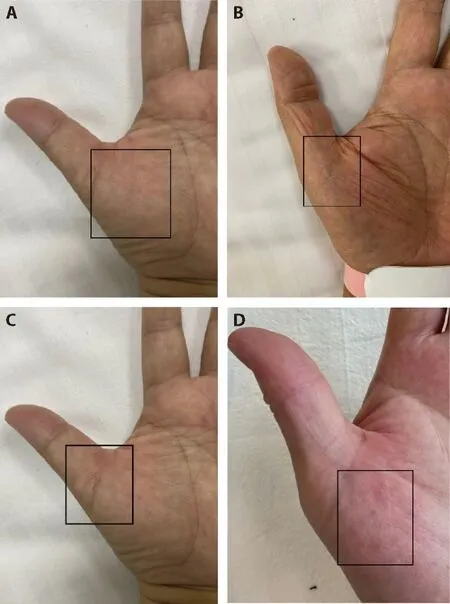
Figure 1 Normal hands vs abnormal hands
2.8.Data collection
The age,sex,occupation,body mass index,clinical symptoms,previous history including hypertension,hyperlipemia and diabetes,smoking history,drinking history,photographic recorded hand characteristics,coronary angiography results and case report forms of all participants who met the inclusion criteria were recorded.Coronary angiography is the gold standard for CAD.The results of coronary angiography of subjects were recorded by intervention room staff.The hand characteristics were photographic recorded by qualified clinical observers.Case report forms were completed by 2 entry clerks respectively.
2.9.Quality control and quality assurance
Clinical observers mastered Qisexingtai hand diagnostic method through unified training and past the assessment.The intervention room staff and clinical observers were blinded to the results of each other throughout the study.Implement a two-level supervision system.The firstlevel of supervision is carried out by the sub-centers and the second-level supervision is carried out by the research group.
2.10.Statistical methods
All data were performed using R 4.1.1 software (R Core Team,Miami,FL,USA).Continuous variables were expressed by mean (standard deviation),median (quad,IQR),maximum and minimum values and Shapiro-Wilk normality test was performed.Under normal distribution conditions,t-test was used for inter-group comparison.Otherwise,Wilcoxon rank-sum test was used for comparison between groups.Classification variables were expressed by frequency (n/N,N was the total number of patients included in the analysis) and percentage,and comparisons between groups were performed by χ2test or Fisher's exact probability method.Then the statistics of sensitivity,specificity,omission diagnostic rate,mistaken diagnostic rate,positive predictive value and negative predictive value were estimated and the receiver operator characteristic curve(ROC) were drawn.
3.RESULTS
3.1.Objects
During the period from November 2020 to September 2021,a total of 370 participates were initially screened.12 participants did not satisfy the inclusion criteria,9 participants met the exclusion criteria.After screening,349 subjects were enrolled.During the study,23 of 349 participants did not complete the trial.Among the 23 participants,5 were with poor compliance,10 were voluntarily withdrew from the study and 8 were with incomplete clinical data.All the data from these 23 participants were excluded from the statistical analysis.As a result,a total of 326 subjects were included in the study,108 from Guang'anmen Hospital,China Academy of Chinese Medical Sciences,108 from Guangdong Provincial Hospital of Traditional Chinese Medicine and 110 from The Second Affiliated Hospital of Guizhou University of Traditional Chinese Medicine.The trial flow diagram is presented in Figure 2.
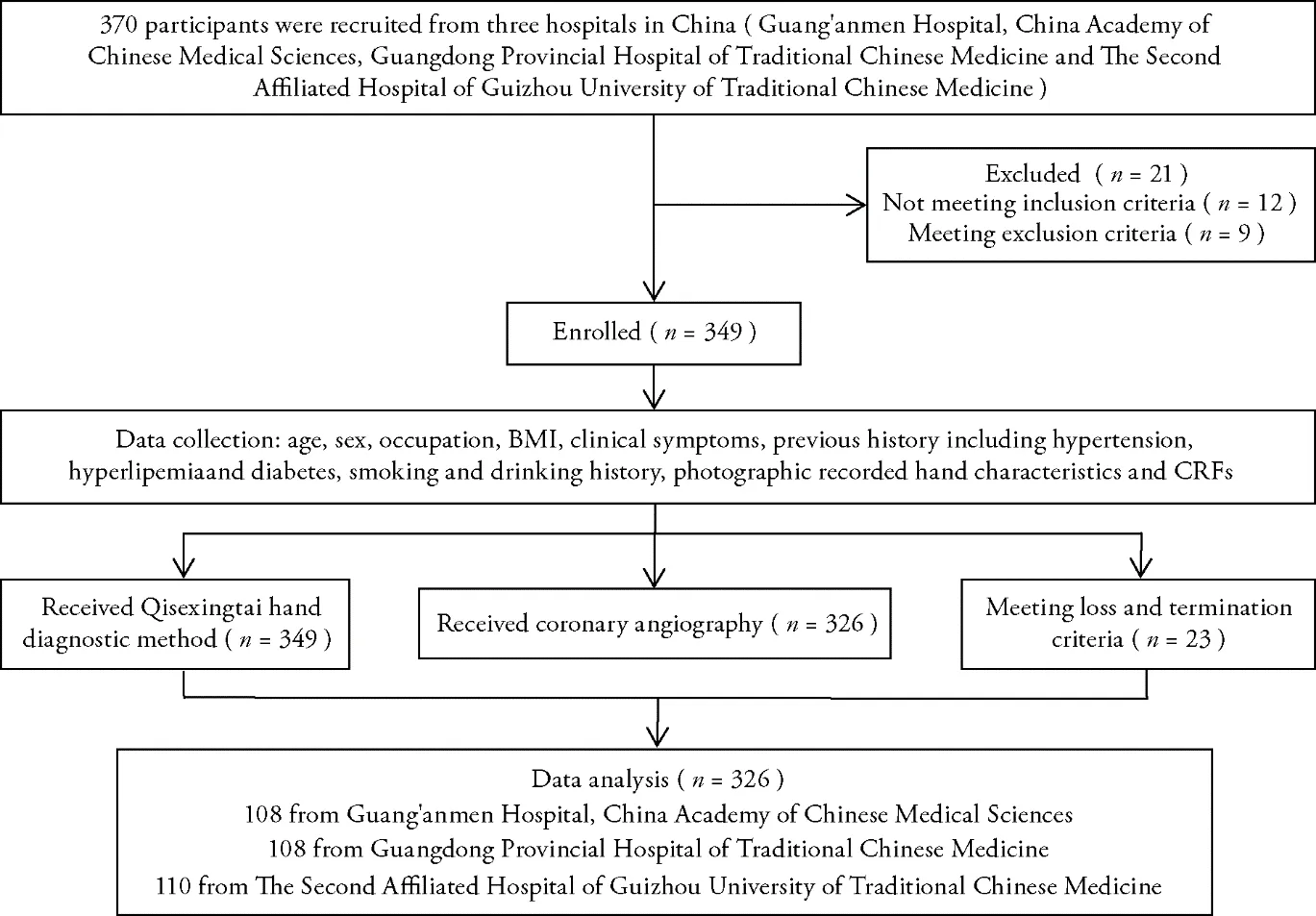
Figure 2 Flow diagram of this study
Among 326 subjects,152 were male and 174 were female.Age ranged from 40 to 88 years,with the average age was (65 ± 10) years.There were 77 drinkers,84 smokers,197 with hypertension,136 with dyslipidemia,90 with diabetes and 71 without complications.The main clinical manifestations were chest distress,fatigue,shortness of breath and palpitation,etc.(Table 1).
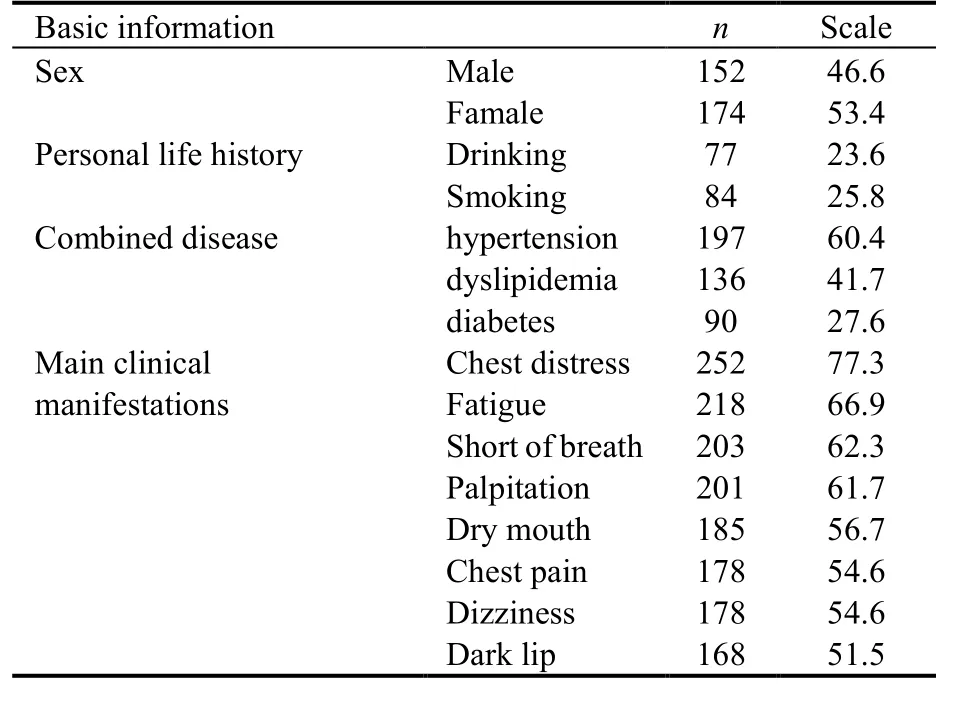
Table 1 Baseline characteristics of the objects [n (%)]
3.2.Comparison between Qisexingtai hand diagnostic method and coronary angiography
Among 326 subjects,there were 166 positive cases according to Qisexingtai hand diagnostic method,and 131 positive cases according to coronary angiography.Compared with the results of coronary angiography,the sensitivity of Qisexingtai hand diagnostic method was 80.2% (105/131),the specificity was 68.7% (134/195),the omission diagnostic rate was 19.8% (26/131),the mistaken diagnostic rate was 31.3% (61/195),the positive predictive value was 63.3% (105/166),the negative predictive value was 83.8% (134/160) and the accuracy was 73.3% (239/326).
3.3.Diagnostic efficacy of Qisexingtai hand diagnostic method for CAD
Area under the receiver operating characteristic curve(AUC) was 0.735.AUC=0.735 for Guang'anmen Hospital,China Academy of Chinese Medical Sciences.AUC=0.783 for Guangdong Provincial Hospital of Traditional Chinese Medicine.AUC=0.718 for the Second Affiliated Hospital of Guizhou University of Traditional Chinese Medicine (Figure 3).
AUC=0.732 in the early stage;AUC=0.736 in the late stage (Figure 4).
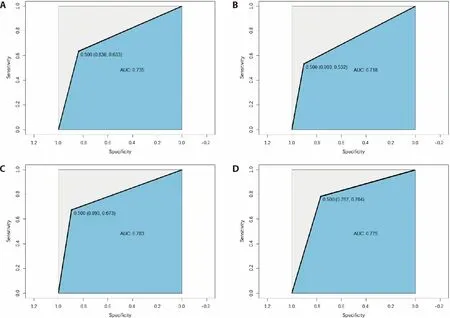
Figure 3 ROC curve of Qisexingtai hand diagnostic method for CAD
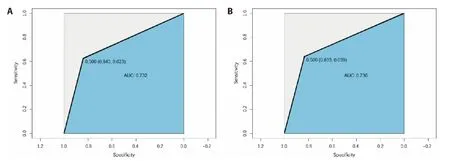
Figure 4 ROC curve in the early stage and late stage
4.DISCUSSION
During more than 30 years of clinical experience,Professor Liu Jianfeng found out that the internal organs of the body corresponded to the specific reaction area of hands,and publishedThe Essence of Qisexingtai Hand Diagnostic Method.3According to Qisexingtaihand diagnostic method,the hand can be divided into 6 specific reaction areas,respiratory system area,circulatory system area,digestive system area,urogenital system area,motor system area and nervous system area.Further,respiratory system area include nose,throat,windpipe,lung,pleura;circulatory system area include heart,hypertension;digestive system area include tooth,esophagus,stomach,colon,liver,gallbladder,etc.The changes ofQi,color and shape in the specific reaction area reflect the nature of diseases in that part of the body.On the basis of basic and clinical studies,4-7Qisexingtai hand diagnostic method has been proven to be effective and spread to more than 40 countries and regions around the world.
As a result of this study,a total of 326 subjects from three hospitals in China were enrolled;166 cases were diagnosed by Qisexingtai hand diagnostic method;131 patients were diagnosed by coronary angiography.Compared with the results of coronary angiography,the sensitivity of Qisexingtai hand diagnostic method was 80.2% (105/131),the specificity was 68.7% (134/195),and the accuracy was 73.3% (239/326).The result suggested that Qisexingtai hand diagnostic method with high accuracy,sensitivity and specificity had certain diagnostic value for CAD as a useful complement.The mistaken diagnostic rate might be caused by following factors: (a) some subjects with the severity of coronary arterial stenoses < 50% had characteristics of CAD in hands;and (b) some subjects with long smoking and drinking history had characteristics of CAD in hands.The omission diagnostic rate might be caused by the factor that the characteristics of CAD were covered by the characteristics of complications in hands.Besides,the accuracy of Qisexingtai hand diagnostic method might be also affected by the mastery of observers for the ROC curve in the late stage was better than in the early one.Early diagnosis and treatment have positive significance to the prognosis of CAD.Qisexingtai hand diagnostic method can be used as an early diagnostic method in clinical practice since it is safe,noninvasive,practical,convenient,cost-effective and acceptable.
There were 23 cases of loss might be caused by following factors: (a) the compliance of subjects was affected by age,gender,education background,occupation and other personal factors;(b) some subjects eventually gave up on coronary angiography due to invasiveness,radioactivity and cost problem;and (c) some subjects didn’t received a well explanation from observers lacking careful scientific attitude.
There were also some limitations in this trial.The sample size,coverage and extensiveness of this study were insufficient.In this regard,we need a larger sample size and effective scientific verification in the future.The accuracy of Qisexingtai hand diagnostic method might be affected by the mastery of observers.Systematic and effective training with sufficient time to observers should be a key component in future clinical trials.
In conclusion,Qisexingtai hand diagnostic method has certain application value in the diagnosis of CAD.
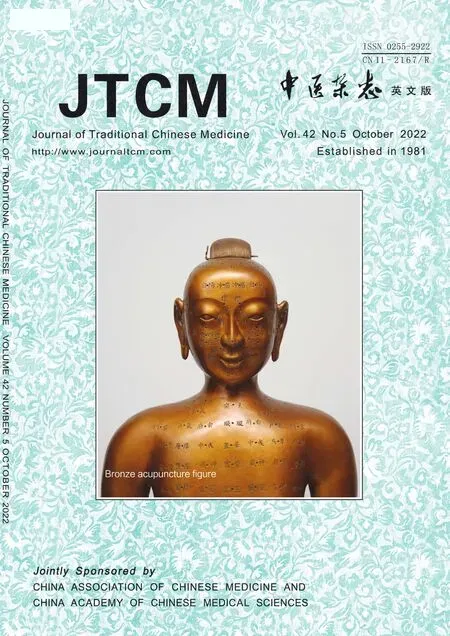 Journal of Traditional Chinese Medicine2022年5期
Journal of Traditional Chinese Medicine2022年5期
- Journal of Traditional Chinese Medicine的其它文章
- Shugan Jieyu capsule (舒肝解郁膠囊) improve sleep and emotional disorder in coronavirus disease 2019 convalescence patients: a randomized,double-blind,placebo-controlled trial
- An infrared thermographic analysis of the sensitization acupoints of women with primary dysmenorrhea
- Preliminary single-arm study of brain effects during transcutaneous auricular vagus nerve stimulation treatment of recurrent depression by resting-state functional magnetic resonance imaging
- Effect of treatment with Fufang Huangqi decoction (復(fù)方黃杞湯劑)on dose reductions and discontinuation of pyridostigmine bromide tablets,prednisone,and tacrolimus in patients with type I or II myasthenia gravis
- Wenshen Jianpi recipe (溫腎健脾方) induced immune reconstruction and redistribution of natural killer cell subsets in immunological nonresponders of human immunodeficiency virus/acquired immune deficiency syndrome: a randomized controlled trial
- Network pharmacology and molecular docking study on the effect of Kaempferol in treatment of metabolic associated fatty liver disease
